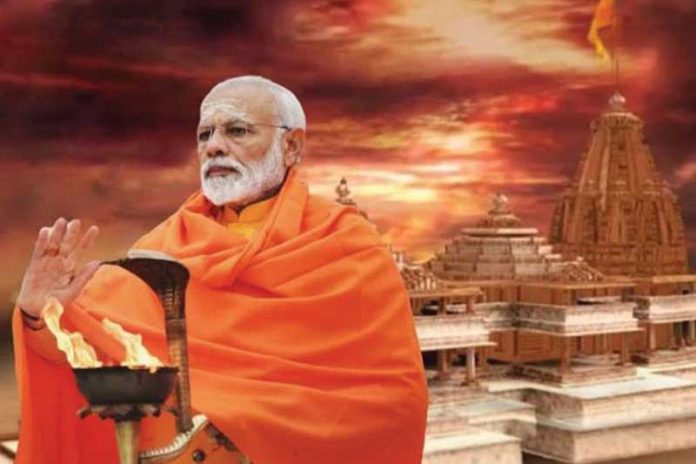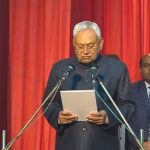The construction of the Ram Mandir at Ayodhya has enormous symbolic importance and is a historic moment for millions of Hindus throughout India. However, as the government’s concerns should be with unemployment, inflation, public welfare, and national security, not temples, the BJP administration is deftly using this opportunity to bolster its political platform. The BJP, led by Prime Minister Modi, frequently claims to be inspired by Lord Shri Ram’s principles, but a closer assessment of policies and governance indicates a significant difference between Lord Ram’s eternal values and the actual actions of the current BJP administration. In order to understand the dramatic disparities between these political viewpoints and Lord Shri Ram’s principles, it is necessary to examine the historical, cultural, and ethical components of both. The article takes a look at how the BJP used the Ram Mandir and Hinduism to advance its political objective, despite how its policies contradict Prabhu Shri Ram’s eternal values.
Does BJP follow Shri Ram Ideology?
In Indian politics, the BJP has formerly positioned itself as a supporter of Hindutva, gaining inspiration from venerated personalities such as Lord Ram. The narrative of safeguarding and supporting Hindu interests has emerged as a significant topic in the BJP’s political efforts, particularly in Hindu-majority districts. A thorough assessment of the party’s administrative practices reveals a complex link between Lord Ram’s principles and the practical governance undertaken by the BJP. The enduring principles of Lord Ram are anchored in justice, environmental stewardship, religious tolerance, women’s empowerment, and good governance, however the contemporary BJP’s policies, in many cases, diverge from the ideals of justice, inclusion, and prosperity associated with Lord Shri Ram’s reign. Let us compare Prabhu Shri Ram’s ideology to the Modi-led BJP’s governance on the scales of good governance and transparency, economic prosperity and employment, women’s empowerment, social harmony and inclusivity, agriculture and farmer welfare, religious tolerance and pluralism, and determine whether it is a true stance or a political distraction from actual issues.
Good Governance, Transparency, and Economic Prosperity:
Hinduism promotes social peace and acceptance of other communities, and Lord Shri Ram’s reign is celebrated for its dedication to good administration and transparency. Lord Ram’s biography is frequently seen as an example of togetherness and tolerance that crosses socioeconomic and cultural boundaries, considering Lord Shri Ram’s teachings highlight the concepts of justice, compassion, and inclusion. Lord Ram’s period is frequently seen as one of economic prosperity and wealth, mostly noted as “Ram Rajya”. His approach to administration, as recounted in the Ramayana, supports fair governance, harmony among diverse communities, and the benefit of all, regardless of caste, creed, or religion.
In contrast to Ram Rajya, the BJP’s reign has been marked by many issues like as corruption, unemployment, economic slowdowns, and worries about equal wealth distribution. Many of the BJP’s policies are reinforcing social and economic imbalances while upholding corporate interests above those of the average man. Controversies like as the Rafale deal and charges of corruption inside the party bring serious question to the BJP’s commitment to transparent and accountable administration. It becomes clear that, only by using the name of Prabhu Shri Ram and by aligning itself with the feelings of millions of Hindus, the BJP is attempting to distract voters from this poor administration, diverting their attention away from true concerns and gathering support for the 2024 Lok Sabha elections.
Empowerment of Women:
Hinduism stresses the value of women in society and sees them as manifestations of Shakti, the divine feminine force. In the Ramayana, Prabhu Shri Ram is presented as a perfect spouse who values and respects women. Lord Ram’s devotion for Sita, as well as his commitment to justice and morality in the treatment of women, are still remembered today. His unflinching attachment to Sita, as well as his adherence to righteousness path, embody ideals that promote gender equality and women’s empowerment.
Lord Shri Ram’s respect for women’s dignity contrasts with concerns about gender issues under the BJP government. Certain BJP policies, including as those on women’s rights and gender-based concerns, have failed to respect the values of gender equality and empowerment. The BJP’s policies and societal attitudes do not reflect the empowerment and equality that Lord Ram represents in Hindu philosophy, and issues such as gender-based discrimination and insufficient representation of women in decision-making positions have also raised concerns about policy alignment with Hindu social values.
Social Harmony and Inclusivity:
Hinduism, while embracing the “Vasudhaiva Kutumbakam” principle (the world is one family), promotes unity and equality among its adherents. Lord Ram’s lifespan is widely viewed as one of justice and fairness for all, as well Prabhu Ram is venerated for upholding the concepts of social justice and inclusion. In the Ramayana, social peace and inclusion are frequently shown as fundamental components of his reign, and Ram Rajya is praised for its emphasis on easing the suffering of the oppressed. Aligning policies with Lord Ram’s devotion to social welfare is critical for preserving a balance between economic development and inclusive progress; nevertheless, many BJP actions and laws do not reflect Lord Ram’s emphasis on a just and equitable society.
Many BJP initiatives unintentionally reinforce caste-based disparities, increasing sectarian tensions and marginalizing particular segments of society. The BJP’s policies, such as the CAA and the NRC, as well as incidents of religious intolerance, are indicative of a deviation from Lord Ram’s inclusive principles. The BJP’s promotion of a majoritarian agenda and marginalization of minority communities continues to persist, as evidenced by incidents of religious violence and policies such as the CAA and the NRC, both of which have raised concerns about religious minority rights. The opposition to reservations, as well as concerns about social justice, have called serious question about the party’s commitment to resolving past imbalances.
Agriculture and Farmer Welfare:
Lord Shri Ram’s life is directly linked to the notion of Ram Rajya, an ideal kingdom in which justice and righteousness reign supreme. Prabhu Shri Ram’s closeness to nature and the wealth of his reign have always encouraged sustainable and farmer-friendly policies, as agriculture was supported and cherished in an ideal condition.
Although Ram Rajya is linked to the welfare of all people, including farmers, in the modern-day government of the BJP has always come under heavy criticism for the way it has handled agricultural concerns, especially the controversial farm bills and farmer suicide. India, under Prime Minister Modi’s leadership, has seen large protests against the BJP’s agriculture policies, with farmers voicing worries about the impact on their lives, since these policies prioritize big businesses above farmers’ interests.
Religious Tolerance and Pluralism:
Hinduism has historically celebrated variety and pluralism, emphasizing the acceptance of many pathways to spirituality. Encouraging discussion and understanding among diverse religious and cultural groups is essential to preserving the fabric of a diversified Hindu society. Lord Shri Ram is also admired for his dedication to justice, righteousness, and inclusiveness. Fostering an atmosphere of openness and religious tolerance is essential for embodying Lord Ram’s values; nevertheless, this emblem of unity and tolerance contradicts with instances of religious divisiveness during the BJP’s administration.
The administration’s attitude to social justice, particularly in terms of caste-based issues and reservations, raises concerns about its compatibility with Lord Ram’s inclusive ideals of government. The BJP’s affiliation with measures that have exacerbated communal tensions raises concerns about its commitment to promoting an inclusive society. The party has engaged in identity politics, using religious beliefs to construct an unusual “us versus them” narrative. Such instances of religious division, as well as worries about intolerance against specific religious narratives, have fanned communal tensions, calling into question the pluralistic principles inherent in Lord Ram’s legacy. This division has, at times, fostered religious tensions and generated worries about the nation’s secular fabric, while also undermining the inclusive spirit inherent in Hindu philosophy.
Fake propagators of Lord Ram’s Sanatan Marg
The BJP, led by Prime Minister Narendra Modi, has developed a reputation for deploying gimmicks to keep the nation’s innocent public under control. Whether it is national or religious sentiments, the BJP has always deflected people’s attention away from important concerns like as economic challenges, healthcare, and social welfare, deterring a more holistic and inclusive approach to governing. A notable example is the Ram Mandir in Ayodhya, along with the wider utilization of Hinduism as a political instrument. Temples are not the government’s responsibility; unemployment, inflation, public welfare, and national security are. Lord Rama, an important personality in the Ramayana, is worshiped as “Maryada Purushottam.” He is regarded as an ideal man for sustaining dharma, unshakable dedication, exceptional leadership, compassion and kindness, self-discipline and sacrifice, and as a perfect husband. Despite all of the challenges thrown at him, he chose the right path. In contrast to Prabhu Shri Ram’s ideology, the politicization of the Ram Mandir has transformed the public debate centered on religious and cultural topics. With the BJP failing to meet most political pledges, Prime Minister Modi’s BJP is only attempting to influence people by tying the making of the Ram Temple in Ayodhya to people emotional responses.










